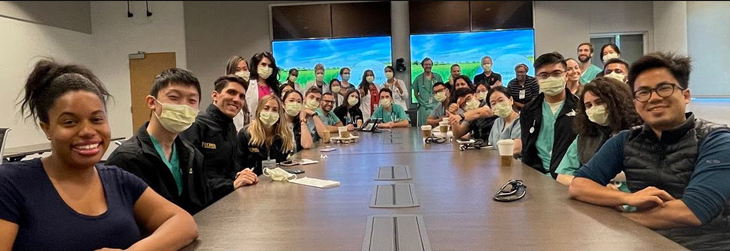Internal Medicine Residency
Conferences and Education

Here you will find a listing of our seminars, didactic and online education modules that we are routinely using in our residency training.
On our 4+2 and 4+4 schedules, residents go to their Academic Half Day whenever they are on the ambulatory portion of their schedule. Intern and upper-level residents separate dedicated academic half days.
- They have no clinical activities scheduled for that Half Day, and thus it is totally protected teaching time.
- The Academic Half Day takes the place of the more conventional noon conferences, and attendance is dramatically higher due to its protected nature.
- It is a great opportunity for socializing among residents and faculty.
- The Academic Half Day meets Thursdays mornings for residents, and Friday mornings for interns
We cover a large number of areas of medicine, including seminars on distinct disease-specific topics (e.g. diabetes care, anemia, leukemia, ventilator management, Journal Clubs, EKG reading, medical interviewing, evidence-based medicine, cost-conscious care, clinical reasoning, and quality improvement, among others). We also have simulation sessions on rapid responses, code blues, and central line placements. Lastly, our POCUS curriculum has regular sessions in the Academic Half Days.
We have a curriculum for the intern year, and a 2-year curriculum for the PGY2 and PGY3 classes that covers all of the specialties of medicine.
- Periodically throughout the year, we do board review sessions in the residents’ Academic Half Day.
- Starting in 2023, we purchased NEJM Knowledge Plus and AMBOSS for each of our residents. This is an excellent, interactive board preparation tool. It also has great rotation specific materials to prepare you for each rotation, including seminal literature articles and great review articles.
- Internal Medicine Grand Rounds is held every Thursday at noon and is video-casted to all hospital sites.
- One quarter of these Grand Rounds are dedicated to case-based clinical topics, such as Clinical Solving Problem Cases, where expert clinicians work through an unknown case presented by our chief residents.
- Once a month, we have our Clinical Grand Rounds, where one of our residents presents an outstanding case from our service, with the resident and experts discussing the complexities and learning points from the case.
- We have a monthly Morbidity, Mortality, Quality and Safety Conference (MMQS) on Monday at noon.
- We do M&M cases with faculty and residents, and we also run Departmental QI projects that are chosen and led by the residents (with faculty mentors helping) over the year.
- We work hard to have this be an educational and never punitive conference.
- Each site has its version of Morning Report, where Chief Residents (or guest resident leaders) moderate a case discussion on common and uncommon medical cases with faculty participation.
- We emphasize the process of clinical reasoning using problem representation, illness scripts, and analytical modes of evaluating cases.
- At the VA and Kaiser sites, some of the morning report time is used for great seminars on radiology reading, M&M, or subspecialist teaching sessions.
- The Primary Care and TEACH residents attend morning report on Tuesdays at UC Davis and we do an outpatient morning report, concentrating on educational cases from clinic, to allow focused discussion on common outpatient problems.
- We utilize the Yale Office-Based Medicine Curriculum, but mainly in small group settings.
- We purchase the NEJM Knowledge Plus/AMBOSS program which has excellent online board and rotation preparation materials.
- One of our Associate Program Directors, Carolina Candotti, is an expert in POCUS, and is part of SHM core POCUS faculty. Jose Zumba is an Assistant Professor of Medicine and an expert in POCUS, who teaches at regional and national POCUS courses, and co-leads the POCUS education for the residents. The POCUS training consists of a longitudinal POCUS curriculum, with monthly didactic POCUS workshops with hands-on scanning in the Sim lab, and didactic lectures. Over a 3-year integrative longitudinal curriculum, residents learn to acquire and interpret focused cardiac, pulmonary, abdominal, soft tissue, and procedure ultrasound images. Ultimately, residents learn to integrate this information into their management decisions as well as expand their educator role through POCUS. In 2024 they started the POCUS Track for a subset of residents interested in advancing their POCUS skills.
- We have a dedicated series of seminars on quality improvement and patient safety topics, led by our VA hospitalists and VA Chief Residents for Quality and Safety.
- All residents in our program leave with the essentials of QI. Those interested in more in-depth training join our one-year QI Track.
- UC Davis has a state-of-the-art simulation suite called the Center for Virtual Care
- Throughout the academic year, residents go the simulation suite to undergo training with diagnostic POCUS didactics, Code blue simulations, and procedural training including Paracentesis, Lumbar Puncture, and Central Lines. There are additional trainers for thoracentesis and ophalmology as well.
- Jose Zumba co-leads the yearly Central line training simulation with the Pulmonary and Critical Care team, for interns and residents
- Jose Zumba leads the yearly Code Blue Simulation training for interns and residents
